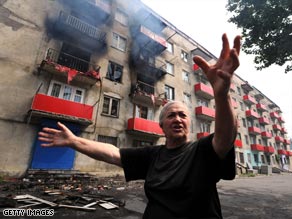
One year after Russian tanks rolled into the former Soviet republic of Georgia, the conflict that erupted over a breakaway territory continues to stoke tensions in the region, with repercussions around the world.
Earlier this month, Georgia and the Russian-backed enclave of South Ossetia accuse each other of violating a cease-fire that ended the brief conflict. In another development with global consequences, an attempt to silence a pro-Georgia blogger with a cyber attack resulted in severe disruptions to social networking sites Twitter and Facebook. Though confined to a relatively small area, last year’s conflict also threatened to spill beyond the region, as frictions elevated between Russia and Ukraine, and Georgia tried to drag in NATO, the European Union and the United States. The conflict erupted after days of sporadic clashes between both sides led to a Georgian assault on South Ossetia’s capital Tskhinvali on August 7, 2008. A day later Russian troops poured into South Ossetia — a region which declared its independence from Georgia in the early 1990s after a bloody ethnic war. During the days of fighting that followed, the Georgian city of Gori came under heavy fire, with reports of Russian jets shelling parts of the city, buildings on fire and numerous casualties.
Don’t Miss
Pro-Georgia blogger target of Twitter attack
Georgia, South Ossetia trade jabs
About 192,000 people were displaced by the violence. Some 38,500 people were reported to have left South Ossetia for Russian territory, of whom all but an estimated 4,000 are now said to have returned. An EU-brokered cease-fire was struck on August 12 after Russian troops had driven Georgian forces out of South Ossetia and Abkhazia, another Russian-backed breakaway — and pushed into Georgian government-controlled territory. Russia claimed it had pulled out its troops by August 22, but left in place “peacekeeping” forces in “buffer zones” to prevent further violence.
Despite the cease-fire, Russia has yet to withdraw its troops to pre-conflict positions and allow unhindered humanitarian access to Abkhazia and South Ossetia, according to the U.S. State Department. Last year’s conflict came as Georgia had been cultivating closer ties with the United States and western Europe and was seeking admission to NATO despite fierce Russian opposition.